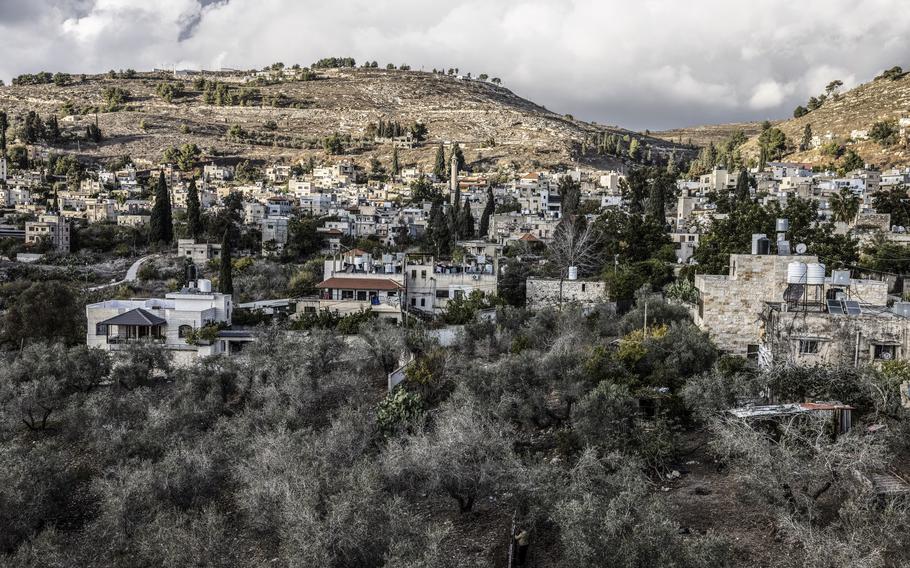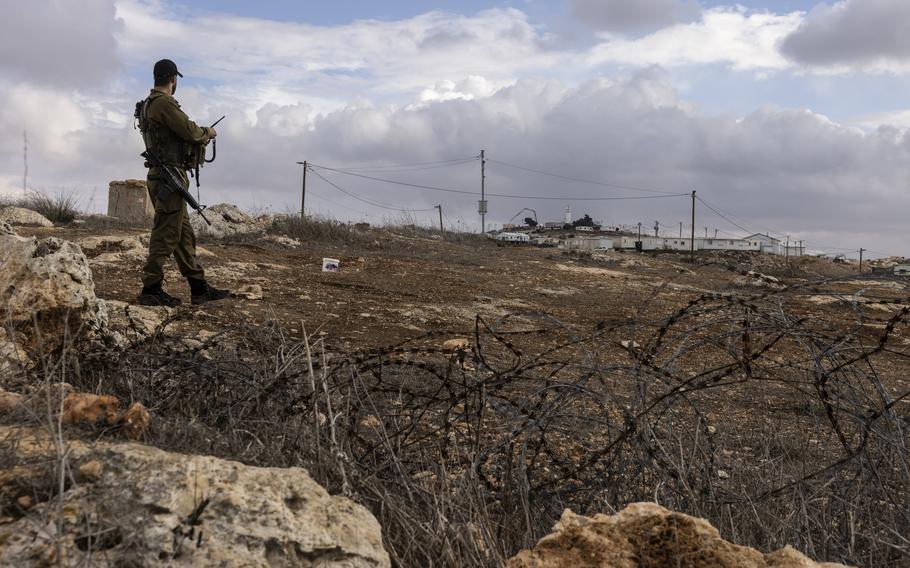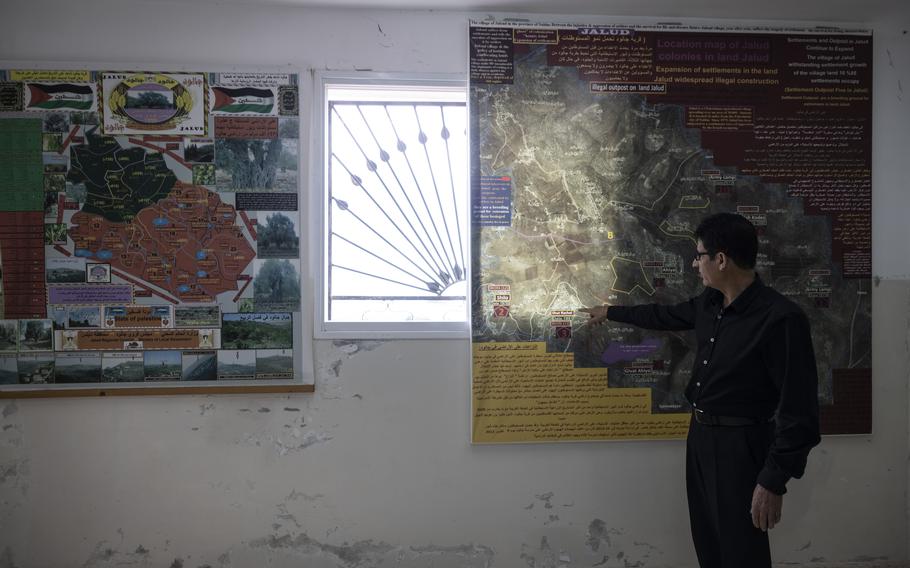
A man repairs a fence in his olive grove last month in the West Bank Palestinian town of Burqa, below the Israeli outpost of Homesh visible on the hilltop. (Heidi Levine for The Washington Post)
JALUD, West Bank — Even before the U.S. presidential election, Israel’s far-right settlers had been rapidly taking ground, buoyed by support in the highest levels of Israeli government. Still, they faced opposition from the country’s most important ally, with the Biden administration imposing sanctions on violent settlers and declaring some settlements illegal under international law.
But now that Donald Trump is returning to the White House, settler activists say they see few obstacles to their plans to rule the occupied West Bank, potentially resettle Gaza and redraw the map of the Middle East. Trump, they say, was a pro-Israel president in his first term and in recent weeks has already nominated like-minded people to key positions on his team.
Among them is former Arkansas governor Mike Huckabee (R), Trump’s pick for U.S. ambassador to Israel. In a recent interview with Israel’s Arutz Sheva, a right-wing outlet headquartered at a settlement, Huckabee said that “there is no such thing” as the West Bank and that Israelis have “a rightful deed” to the land.
“Trump’s victory brings an important opportunity for the state of Israel,” Israeli Finance Minister Bezalel Smotrich, whose oversees the settlements, told supporters at a conference last month. During Trump’s first term, he said, “we were on the verge of applying sovereignty over the settlements” in the West Bank. “Now, the time has come to make it a reality.”
All of this has left settlers “euphoric,” said Hagit Ofran, co-director of the Settlement Watch project at Peace Now, an Israeli advocacy group that monitors settlement growth. Smotrich, who lives in the Kedumim settlement in the northern West Bank, has also called for Israel to reestablish settlements in Gaza and “encourage” the Palestinian population there to leave.
“They think they’ve won the lottery,” Ofran said of the settlers. “They think they can do whatever they want, and I believe they are right.”
Israelis began building in the West Bank and Gaza soon after Israel captured the territories from Jordan and Egypt in 1967, claiming in part that the land was the ancestral home of the Jewish people. Over the past six decades, Israeli settlements have either swallowed or carved through much of the land that would make a future Palestinian state.
In July, the International Court of Justice said this construction was illegal, issuing a nonbinding opinion that Israel must end its occupation and dismantle settlements.
The United States has also long held that Israeli settlements are “inconsistent with international law” — a position first outlined in a 1978 State Department memo. Since then, U.S. administrations have generally opposed settlement building, describing it as an obstacle to peace. But over time, and as construction continued, U.S. negotiators accepted that Israel would probably keep some of its largest settlements in any peace deal with the Palestinians.
Trump himself has not yet said whether he would support Israeli annexation. But settlers say they see clues from his first term: He reversed decades of U.S. policy and recognized Jerusalem, a contested city, as Israel’s capital. He also formally accepted Israel’s annexation of the Golan Heights, territory that Israel captured from Syria in 1967.
In 2020, Trump unveiled a sweeping peace plan for the conflict that would have allowed for the creation of a Palestinian state, while granting Israel sovereignty over much of the West Bank. The plan was never implemented or agreed to, and Huckabee, in his interview with Arutz Sheva, said he does not expect Trump to support a two-state solution. The president-elect’s transition team did not respond to requests for comment.
Alongside Huckabee, Trump has said he will nominate Rep. Elise Stefanik (R-N.Y.), a fierce critic of anti-Israel protests at American universities, to be U.S. ambassador to the United Nations. For Middle East envoy, Trump has said he will select Steven Witkoff, a real estate investor who helped raise funds for Trump’s campaign after Biden paused a weapons shipment to Israel.
Trump is not “Israel’s messiah,” said Naomi Kahn, director of the international division at the pro-settler lobbying group Regavim. But with him in the White House, she said, “there is a better chance that Israel will have its voice restored as a sovereign nation.”

The settlement of Ahiya last month, seen from the edge of the Palestinian village of Jalud. (Heidi Levine for The Washington Post)
For Palestinians in the West Bank, Trump’s return has deepened fears of mass displacement. Jalud, a quiet hamlet of 840 residents near the city of Nablus, is encircled by eight settlements and informal outposts, said its mayor, Rae Haj Mohammad. The communities, including Shilo to the south and Ahiya to the west, expand their footprint each day, Mohammad said, pointing to the diggers and cranes along the horizon.
Settlers have for years stopped Jalud residents from grazing animals and harvesting olives in surrounding pastures. But in mid-October, a mob of settlers stormed directly into Jalud and carried out one of the most violent attacks the village has seen. Assailants torched cars, killed livestock and destroyed two houses as Israeli soldiers stood aside, residents said.
The Israel Defense Forces denied in a statement that its troops were in Jalud as the attack was underway. “The incident was reported to security forces only after the damage in the village had occurred,” the IDF said.
Since the start of the olive harvest season in October, Palestinian farmers have faced a sharp increase in settler-related violence, the United Nations Office for the Coordination of Humanitarian Affairs said on Thursday. Attacks by settlers that resulted in casualties or property damage tripled compared with each of the preceding three years, the agency said.
Early last month, U.S. State Department spokesperson Matthew Miller condemned the assault in Jalud and said Israel had not done enough to curb settler violence, which has soared since the Oct. 7, 2023, Hamas attacks. But just days later, Trump won the presidential election and Israeli leaders were openly calling for annexation.

Rae Haj Mohammad, mayor of the Palestinian West Bank village of Jalud, stands last month with two large maps showing the expansion of Israeli settlements in the area. (Heidi Levine for The Washington Post)
A wave of dread soon descended on Jalud, said Hisham Hmoud, 32. During the attack, he was pushed to the ground outside his house as his wife and three children hid in a locked bedroom. “What we face now,” Hmoud said, placing his head in his hands, “it’s a catastrophic situation.”
More than 2,000 Palestinians have been forced from their land in the West Bank since Israeli Prime Minister Benjamin Netanyahu returned to power two years ago, according to the West Bank Protection Consortium, an initiative funded by the European Union to prevent Palestinian displacement. An additional 58,000 are “at direct risk of forcible transfer,” meaning they reside on land that could be seized for settlement construction, the consortium says.
Human rights groups that document settler violence, including Rabbis for Human Rights and B’Tselem, say escalating attacks in recent months have made it difficult to access the most contentious parts of the West Bank, such as villages near Nablus and the South Hebron Hills.
In July, masked settlers used clubs to attack Palestinian farmers and a group of foreign activists accompanying them in the town of Qusra, which neighbors Jalud. A month later, a mass of dozens of settlers shot live ammunition at Palestinians in another nearby village, Jit, killing one resident and injuring others.
The IDF has done little to stem the violence, working increasingly in tandem with settlers to cut Palestinian towns and villages off from one another and to block Palestinian residents from their land, according to watchdog groups and Palestinian leaders. The IDF has called these allegations “baseless.”
But against opposition from Israel, the Biden administration this year placed several rounds of sanctions on settlement groups and individual settlers responsible for attacks on Palestinian communities. It targeted, among other entities, two outposts in the South Hebron Hills, barring them and their owners from accessing U.S. property or assets or working with U.S. financial institutions.
Last month, the Biden administration also imposed sanctions on Amana, an organization that builds and develops settlements.
But those sanctions could soon be lifted. Trump’s pick for secretary of state, Sen. Marco Rubio (R-Fla.), has said he opposes the restrictions and earlier this year wrote a letter to the State Department admonishing it for imposing them. “Israelis rightfully living in their historic homeland are not the impediment to peace; the Palestinians are,” Rubio said.
In the Palestinian town of Burqa, just outside the administrative capital, Ramallah, residents say they have watched as a once-illegal settlement was reestablished on a nearby hilltop with Israeli government support. Homesh started last year as a single yeshiva and has grown into a sprawling community with roads, power lines and cell towers.
“Trump will make this worse,” said Miqdad Salah, 59, a Burqa resident. “We saw in his previous term what he did,” he added, citing Trump’s decisions on Jerusalem and the Golan Heights.
Palestinian residents say they fear the violence will only get worse. On Friday, Hamas claimed responsibility for a shooting attack on a bus near the West Bank settlement of Ariel. The Palestinian gunman wounded eight people, including four Israeli soldiers, before he was shot dead.
In Jalud, the Hmouds said they are still recovering from the last attack.
For over a month, said Lina Hmoud, 30, she has awakened at night sweating, terrified the settlers have returned. The family has moved to a relative’s house deeper in the town as Hisham Hmoud fortifies their home with more concrete and metal. When the children ask about whether it’s still safe to live in Jalud, Hmoud said he lies and says, “Of course.”
In recent decades, he has watched his village lose more than half its land to settlers. “Now,” he said, “we will lose everything else that remains.”
Taylor reported from the West Bank and Washington.